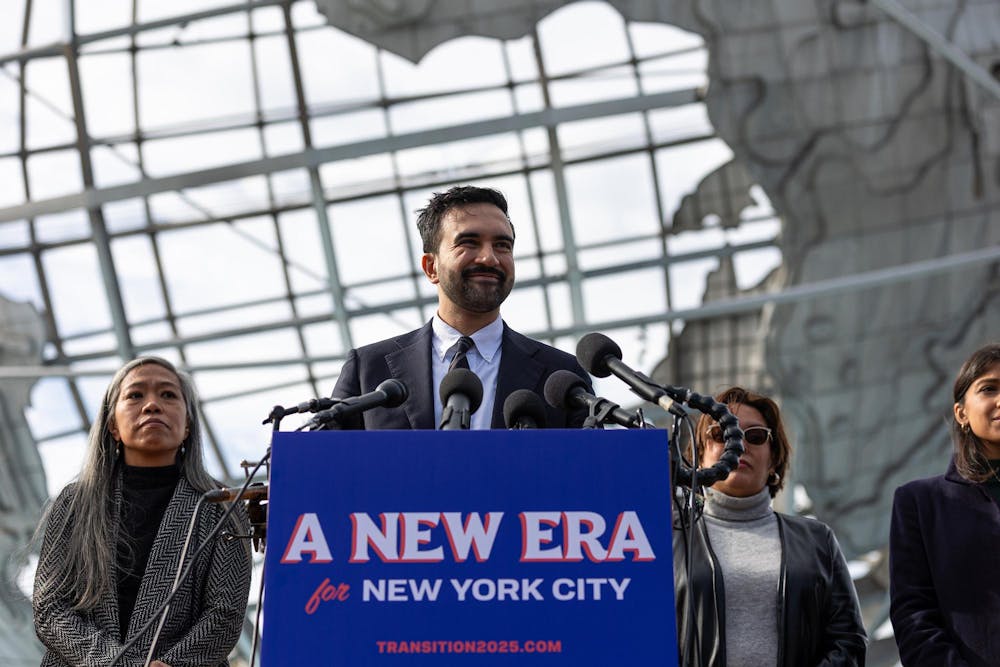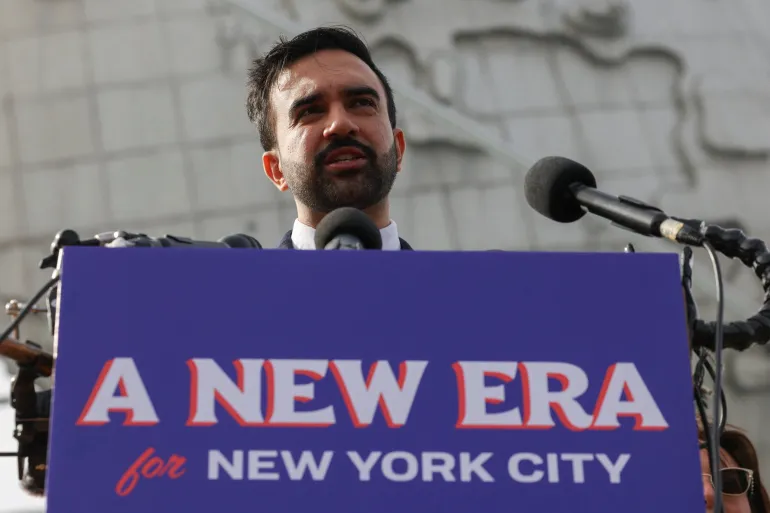
New York City mayor-elect Zohran Mamdani speaks in front of the Unisphere on Nov. 5, 2025, in Queens, New York. Mamdani won the New York City mayoral election Nov. 4, 2025.
Photo by Tribune News Service / The Indiana Daily StudentNew York City recently elected a mayor who has been attacked not for what he believes but for who he is challenging. Since his rise in the city’s political scene, Zohran Mamdani has faced deliberate mispronunciations of his name, racist insinuations that he is a “jihadi” and attempts to call him “un-American” simply because he champions empathetic politics. These attacks aren’t random — they are coordinated institutional reactions meant to discredit anyone who challenges systems protecting power and capital.
Right-wing media claim Mamdani’s policies are radically communist and aims to create a socialist NYC. However, his vision is grounded in empathy and data, not substantially different from that of many major cities worldwide. Mamdani wants a city where everyone has access to the necessities of life — not only because it is right, but because a city where everyone can succeed achieves greater economic and cultural success. He advocates for free public transit, stronger tenant protections, and public social housing funded by taxes on luxury real estate owners.
Opponents contend that “socialism is good until people have to pay for it.” Mamdani challenges this logic, explaining that only the wealthiest New Yorkers would pay marginally more. This outrages many in the ruling class—but ironically, some of those same critics complain New York City is a “third-world city.” Mamdani has pushed to reform the city’s tax system that preys on vulnerable New Yorkers while giving breaks to major corporations and increased investment in the public school system. His ideas aren’t radical — they’re pragmatic solutions to problems millions are facing. While Mamdani may not fulfill every campaign promise, his policies clearly scare politicians who fear alternative ideas. He isn’t a “radical;” he has ideas that are new and exciting, something the rest of the Democratic Party should note. The same old playbook won’t work anymore.

Before Mamdani’s win, the media moved to discredit him. The Guardian reported that billionaire figures like Michael Bloomberg and Bill Ackman gave millions to political action committees dedicated to destroying Mamdani, joining supposed “liberal” media outlets eager to brand him as a “radical.” These aren’t typical right-wing opponents — they are Democrats who serve capital. Unsurprisingly, President Trump joined the smear campaign as his approval ratings hit record lows, calling Mamdani a “100% Communist lunatic” and threatening to pull federal funding from New York City if Mamdani were to win. Trump’s fear is palpable as he tries to stop Mamdani before he has a chance to succeed.
In a society built on ruthless corporate profit, compassion is treated as a revolutionary concept. The attacks on Mamdani’s identity are not just about his race or religion — it’s fear of change, redistribution and challenging the system. This manufactured fear is deeply rooted in our culture. We are trained to recoil at words like “socialism,” not because we understand them, but because we have been conditioned to. The concept has been stripped of meaning and replaced with propaganda defending the status quo.
When Mamdani calls himself a democratic socialist, he means tax dollars should improve collective life, including efficient public transportation, affordable housing and quality public schools—ideas most Americans support. We rely on public education and Supplemental Nutrition Assistance Programs yet they remain underfunded and vilified, preventing them from reaching their potential. The issue isn’t that these ideas don’t exist — it’s that they’re deliberately weakened, so they never gain credibility.
Mamdani is one of many political activists to face backlash for prioritizing the working class over corporate interests. From Eugene Debs to Martin Luther King Jr. to Bernie Sanders, anyone who has demanded economic justice has been outcasted. King’s “I Have a Dream” speech is celebrated, but his “Poor People’s Campaign,” which called to restructure the economy, was met with surveillance and scorn. Sanders was dismissed as “radical” for advocating free college and universal healthcare. These figures, like Mamdani, expose the illusion that our current system is inevitable,” which called to restructure the economy, was met with surveillance and scorn. Sanders was dismissed as “radical” for advocating free college and universal healthcare. These figures, like Mamdani, expose the illusion that our current system is inevitable.
British theorist Mark Fisher calls this illusion capitalist realism — the belief that capitalism is not only the best economic system but the only one. It convinces people basic needs are “too expensive,” while CEO pay has risen over 1000% since 1978 compared to a 15% increase for workers. When figures like Mamdani challenge that belief, institutions attack like a hive mind. Mainstream media — largely owned by corporations or influenced by political elites—play a central role in manufacturing fear. With ease, moral ambition becomes a threat, and proposals to tax the ultra-wealthy become “anti-business.” This is not coincidental—it’s strategic. They know a clear-minded, well-informed working class threatens the current system.
Even internationally, the American government has worked tirelessly to preserve this illusion. It has destabilized, sanctioned and overthrown governments that dared to adopt socialist or anti-capitalist models, from Chile to Iran to Cuba, then pointed to them as proof that nothing else could work. In reality, those nations were punished for showing alternatives could work.
Indiana Democrats should take note and learn from Mamdani’s unapologetic commitment to his message. In a state where Republican dominance often suppresses boldness, Mamdani’s politics remind us that it is conviction that inspires people, not compromise.
Rather than considering which messages will poll best — a problematic fixation of many Democrats — progressive Indiana leadership needs to focus on building a movement that provides voters with excitement and hope. Mamdani has shown that speaking directly to the needs of ordinary people can energize voters even in the most hostile environments.
The attacks against Mamdani are not isolated. They’re part of a long-standing effort to cast fear on logical debate about alternative ideas. Their fear doesn’t delegitimize his ideas; it exposes how fragile our system is and how terrified the establishment is of an informed, unified America.
Related
The Republican and Democratic parties are becoming increasingly polarized.
Max Moore (he/him) is a junior studying political science and journalism.
Leave a Reply